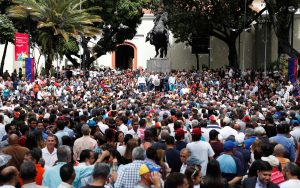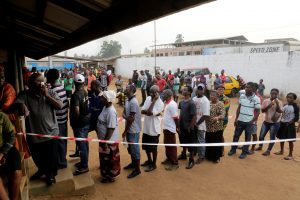
By David Brunnstrom
PALO ALTO, Calif. (Reuters) – The United States on Wednesday signaled an open-ended military presence in Syria as part of a broader strategy to prevent Islamic State’s resurgence, pave the way diplomatically for the eventual departure of Syrian President Bashar al-Assad and curtail Iran’s influence.
Secretary of State Rex Tillerson, in a speech at Stanford University, called for “patience” on Assad’s departure – the clearest indication yet of an acknowledgment that Russia and Iran have bolstered Assad and that he is unlikely to leave power immediately.
Billed as the Trump administration’s new strategy on Syria, the announcement will prolong the risks and redefine the mission for the U.S. military, which has for years sought to define its operations in Syria along more narrow lines of battling Islamic State and has about 2,000 U.S. ground forces in the country.
While much of the U.S. strategy would focus on diplomatic efforts, Tillerson said:
“But let us be clear: the United States will maintain a military presence in Syria, focused on ensuring ISIS cannot re-emerge,” while acknowledging many Americans’ skepticism of military involvement in conflicts abroad, Tillerson said.
U.S. forces in Syria have already faced direct threats from Syrian and Iranian-backed forces, leading to the shoot-down of Iranian drones and a Syrian jet last year, as well as to tensions with Russia.
Trump administration officials, including Defense Secretary Jim Mattis, had previously disclosed elements of the policy but Tillerson’s speech was meant to formalize and clearly define it.
A U.S. disengagement from Syria would provide Iran with an opportunity to reinforce its position in Syria, Tillerson said.
As candidate, U.S. President Donald Trump was critical of his predecessors’ military interventions in the Middle East and Afghanistan. As president, however, Trump has had to commit to an open-ended presence in Afghanistan and, now, Syria.
The transition to what appears to be open-ended stability operations in Syria could leave those U.S.-backed forces vulnerable to shifting alliances, power struggles and miscommunications as Assad’s allies and enemies vie for greater control of post-war Syria.
After nearly seven years of war, hundreds of thousands of Syrians killed and a humanitarian disaster, Tillerson asked nations to keep up economic pressure on Assad but provide aid to areas no longer under Islamic State’s control.
Tillerson said free, transparent elections in which the Syrian diaspora participate “will result in the permanent departure of Assad and his family from power. This process will take time, and we urge patience in the departure of Assad and the establishment of new leadership,” Tillerson said.
“Responsible change may not come as immediately as some hope for, but rather through an incremental process of constitutional reform and U.N.-supervised elections. But that change will come,” he said.
Syrian opposition member Hadi al-Bahra welcomed Tillerson’s announcement but urged more details.
“This is the first time Washington has said clearly it has U.S. interests in Syria that it is ready to defend,” Bahra told Reuters.
However, he said, more clarity was needed on how Washington will force the implementation of the political process and how it “will force the Assad regime into accepting a political settlement that leads to establishing a safe and neutral environment that leads to a transition through free and fair elections.”
“SWISS CHEESE”
The top U.S. diplomat said Washington would carry out “stabilization initiatives” such as clearing landmines and restoring basic utilities in areas no longer under Islamic State control, while making clear that “‘stabilization’ is not a synonym for open-ended nation-building or a synonym for reconstruction. But it is essential.”
Tillerson said the United States would “vigorously support” a United Nations process to end the conflict, a so-far stalled process, and called on Russia, a main supporter of Assad, to “put new levels of pressure” on the Syrian government to “credibly engage” with U.N. peace efforts.
The United Nations Special Envoy for Syria said on Wednesday he had invited the Syrian government and opposition to a special meeting next week in Vienna.
But it was not immediately clear how or why Moscow would heed Washington’s oft-repeated demands.
James Jeffrey, a former U.S. ambassador to Turkey and Iraq who served as a deputy national security adviser to President George W. Bush, said that while Tillerson set down the broad parameters of a first comprehensive U.S. strategy for Syria, he left major questions unanswered.
“It’s full of holes like Swiss cheese, but before we just had the holes,” said Jeffrey, a fellow at the Washington Institute for Near East Policy.
Key questions that Tillerson left unaddressed, he continued, included how long Assad should remain in power and whether he would play a role in any political transition.
Tillerson praised Turkey’s role in taking on Islamic State. Ties between the two countries have been strained over U.S. support for the Syrian Democratic forces, the mainly Kurdish-led militias fighting Islamic State in northern Syria with the help of U.S. forces.
The U.S.-led coalition said on Sunday it was working with the SDF to set up a 30,000-strong force that would operate along the borders with Turkey and Iraq, as well as within Syria.
Assad responded by vowing to crush the new force and drive U.S. troops from Syria. Russia called the plans a plot to dismember Syria and place part of it under U.S. control, and Turkey described the force as a “terror army.”
(Reporting by David Brunnstrom; Additional reporting by Phil Stewart, David Alexander and Jonathan Landay; Writing by Yara Bayoumy; Editing by James Dalgleish)




